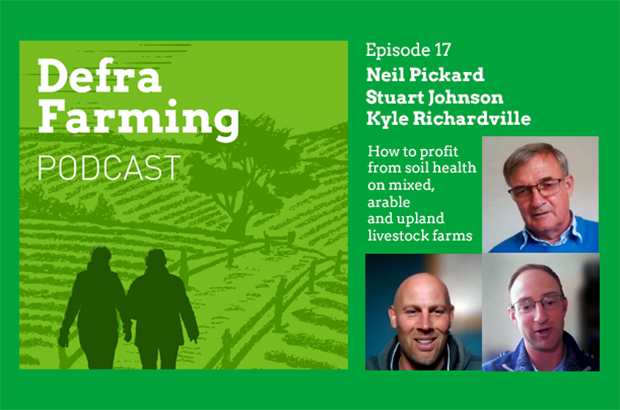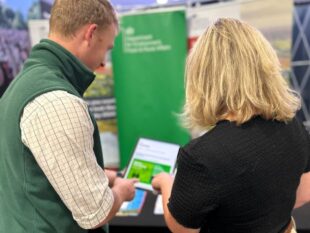
In this episode of the Defra Farming podcast, guest host Neil Pickard, an independent farming adviser with more than 45 years’ experience in livestock and mixed farming, talks with Stuart Johnson, Soil Farmer of the Year 2023, and Kyle Richardville from Understanding Ag.
They discuss how improving soil health can increase profitability on mixed, arable and upland livestock farms.
Stuart farms in Northumberland as a tenant farmer with sheep and cattle. Over time, he has moved from a high-input, conventional system to one that focuses on soil health.
Kyle brings a scientific perspective, drawing on his research into soil microbial populations and his experience advising farmers in the UK and the US.
Neil highlights the need to tailor approaches to different systems:
“We’ll cover mixed and arable farms, but we also need to discuss the all-grassland farm in both upland and lowland situations, as this can be more challenging.”
Together, Stuart and Kyle explore how better soil health can reduce reliance on expensive inputs, build resilience and improve whole farm efficiency. They discuss the different challenges for mixed, arable and upland livestock farms, and share practical steps to get started.
Stuart recalls his first steps:
“To me, direct drilling was just saving a lot of money. So I started exploring that. We began with low-input tillage, sometimes it went well, sometimes not so well, then moved towards low-input applications too. Some had great success, and some were huge failures.”
He explains how the numbers encouraged him to keep going:
“I’m a number cruncher. I realised that if we aimed for a slightly lower yield while maintaining soil stability and fertility, we could find the sweet spot in terms of margins. It all boiled down to finances, and of course, work-life balance played a part too.”
Kyle explains why soil health underpins farm productivity:
“Soil is the foundation of everything. If we don’t have functioning soil, we don’t have functioning productivity. Then we have to bring in external, expensive products like fertiliser or chemicals, and that costs money.”
The discussion covers practical lessons from Stuart’s farm, the importance of monitoring soil organic matter, and the value of learning continuously from other farmers, advisers and scientific research.
Both guests highlight the financial and lifestyle benefits.
For Stuart, focusing on soil health has improved profit margins, reduced tractor hours, and created more time for livestock and family.
For Kyle, the science shows that ecological and economic resilience go hand in hand.
Share your thoughts
We’d love to hear your thoughts on the podcast. If you’ve tried improving soil health on your farm, or are planning to, leave a comment and share your experiences.
Subscribe to the Farming Blog to receive an email notification whenever a new podcast episode or post is published.



 The
The 
2 comments
Comment by Richard Watson posted on
It's a no-brainer: fewer expensive, tine-consuming inputs, better for the health of the soil and (probably) of consumers since they are not ingesting chemicals. And much better for wildlife and nature of course. Some may say that the downside is lower yields, but so much of the grain and grass we grow just goes to feed the cattle through the winter. Switch to hardy cattle and we could eat that grain ourselves.
Comment by The Team posted on
Thanks for listening, Richard!